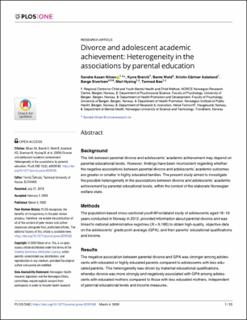| dc.contributor.author | Nilsen, Sondre Aasen | |
| dc.contributor.author | Breivik, Kyrre | |
| dc.contributor.author | Wold, Bente | |
| dc.contributor.author | Askeland, Kristin Gärtner | |
| dc.contributor.author | Sivertsen, Børge | |
| dc.contributor.author | Hysing, Mari | |
| dc.contributor.author | Bøe, Tormod | |
| dc.date.accessioned | 2020-04-03T08:58:47Z | |
| dc.date.available | 2020-04-03T08:58:47Z | |
| dc.date.created | 2020-04-02T16:28:41Z | |
| dc.date.issued | 2020 | |
| dc.identifier.citation | PLOS ONE. 2020, 15(3): e0229183 | en_US |
| dc.identifier.issn | 1932-6203 | |
| dc.identifier.uri | https://hdl.handle.net/11250/2650231 | |
| dc.description.abstract | Background
The link between parental divorce and adolescents’ academic achievement may depend on parental educational levels. However, findings have been inconsistent regarding whether the negative associations between parental divorce and adolescents’ academic outcomes are greater or smaller in highly educated families. The present study aimed to investigate the possible heterogeneity in the associations between divorce and adolescents’ academic achievement by parental educational levels, within the context of the elaborate Norwegian welfare state.
Methods
The population-based cross-sectional youth@hordaland study of adolescents aged 16–19 years conducted in Norway in 2012, provided information about parental divorce and was linked to national administrative registries (N = 9,166) to obtain high-quality, objective data on the adolescents’ grade point average (GPA), and their parents’ educational qualifications and income.
Results
The negative association between parental divorce and GPA was stronger among adolescents with educated or highly educated parents compared to adolescents with less educated parents. This heterogeneity was driven by maternal educational qualifications, whereby divorce was more strongly and negatively associated with GPA among adolescents with educated mothers compared to those with less educated mothers, independent of paternal educational levels and income measures.
Conclusions
Among adolescents whose parents have low educational qualifications, parental divorce is not associated with their academic achievement. Educated divorced mothers appear less likely to transfer their educational advantages onto their children than nondivorced equally educated mothers, perhaps due to a “double-burden” regarding work pressure and child-rearing responsibilities. There is a need for future studies to detail the mechanisms underlying this finding. | en_US |
| dc.language.iso | eng | en_US |
| dc.publisher | Public Library of Science (PLOS) | en_US |
| dc.rights | Navngivelse 4.0 Internasjonal | * |
| dc.rights.uri | http://creativecommons.org/licenses/by/4.0/deed.no | * |
| dc.title | Divorce and adolescent academic achievement: Heterogeneity in the associations by parental education | en_US |
| dc.type | Peer reviewed | en_US |
| dc.type | Journal article | en_US |
| dc.description.version | publishedVersion | en_US |
| dc.source.volume | 15 | en_US |
| dc.source.journal | PLOS ONE | en_US |
| dc.source.issue | 3 | en_US |
| dc.identifier.doi | 10.1371/journal.pone.0229183 | |
| dc.identifier.cristin | 1805052 | |
| dc.description.localcode | Copyright: © 2020 Nilsen et al. This is an open access article distributed under the terms of the Creative Commons Attribution License, which permits unrestricted use, distribution, and reproduction in any medium, provided the original author and source are credited. | en_US |
| cristin.ispublished | true | |
| cristin.fulltext | original | |
| cristin.qualitycode | 1 | |

